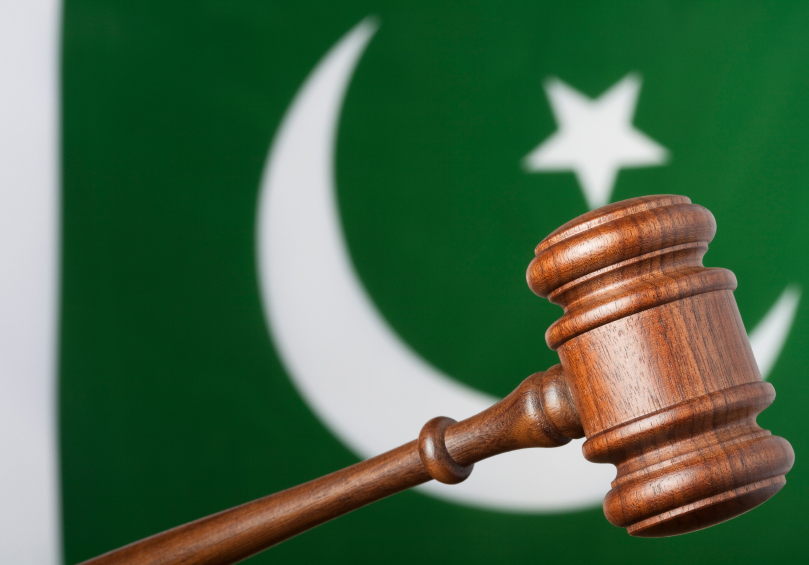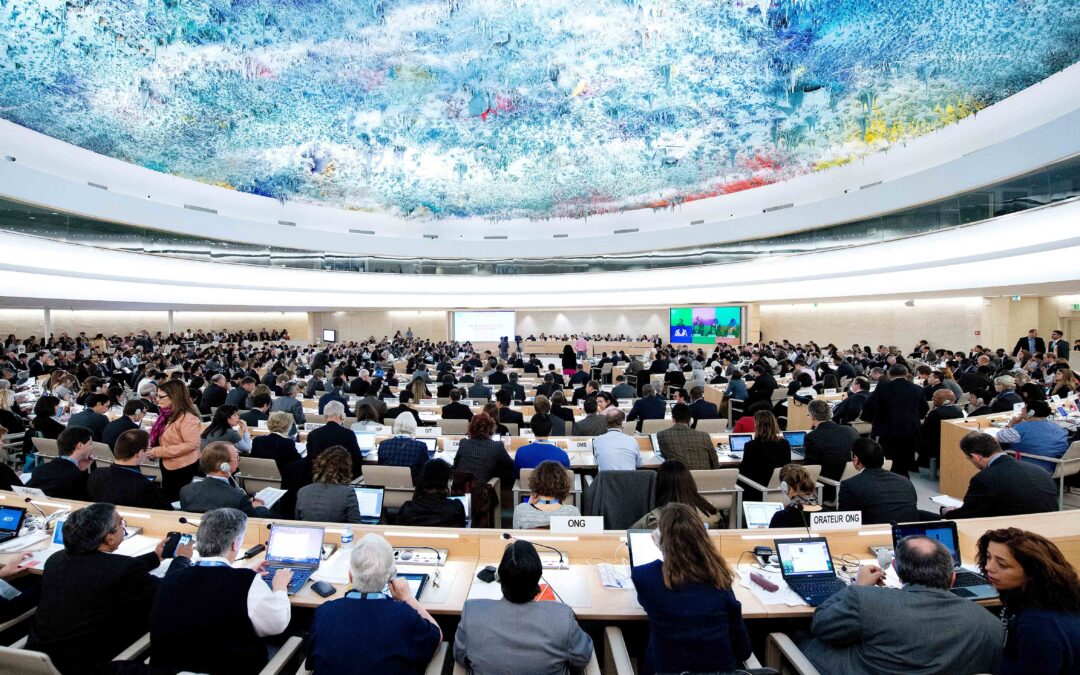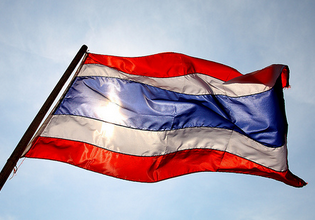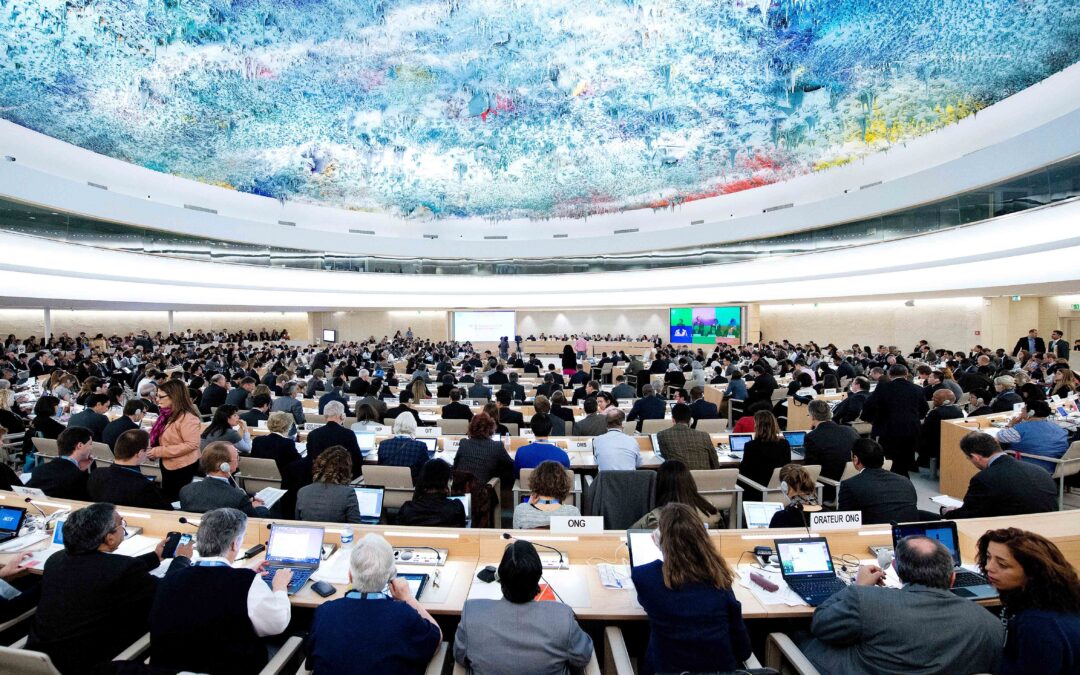
Mar 14, 2017 | News
The ICJ urged the Pakistan government to withdraw its proposal to reinstate and widen the scope of military trials for civilians.
“Bringing back military courts is an attempt to deflect attention from the real issue: the Government’s failure to enact reforms to strengthen the criminal justice system during the two years the 2015-2017 military courts were in operation,” said Sam Zarifi, ICJ’s Asia Director.
Bills to amend the Constitution of Pakistan and the Army Act, 1952, to extend the jurisdiction of military courts to try a wide variety of terrorism-related offences, were introduced before the National Assembly (lower house of parliament) on Friday, 10 March.
The “terrorism-related” offences include, among others: abducting any person for ransom; raising arms of waging war against Pakistan; causing any person injury of death; using or designing vehicles for terrorist attacks; creating terror or insecurity in Pakistan; and attempting, aiding or abetting any of these acts.
The new amendments are also applicable in all cases where the accused commit “grave and violent acts against the State”. The mandatory requirement to belong to a group that uses “the name of religion or sect”, as introduced by the 21st Amendment and corresponding amendments to the Army Act introduced in 2015, is no longer applicable.
“The expansion of military courts’ jurisdiction over all ‘grave and violent acts against the State’ creates the possibility that these courts could be used against a wide variety of people, including those who are legitimately exercising their rights to speech, association, and assembly,” added Zarifi.
According to the preambles of the bills, an “extraordinary situation” and a “grave and unprecedented threat to the integrity of Pakistan” still exist in the country, and military courts are being revived because they “yielded positive results in combatting terrorism” in the two years they were in operation.
“The military courts have not had any positive results in combating terrorism, given the country’s ongoing problem with acts of terrorism and armed insurgents,” said Zarifi. “Instead, military trials of civilians have further eroded the rule of law and weakened the government’s legitimacy in providing justice and defending the rights of people in Pakistan.”
Background
Military courts constituted under the 21st Amendment convicted 274 people in the two years during which they were in operation, from 7 January 2015 to 6 January 2017. Of those 274 convictions, 161 people were sentenced to death and 113 people were given prison sentences. At least 17 people given death sentences have been executed by hanging. The enabling legislation for these courts lapsed on 6 January 2017 pursuant to a two-year sunset clause.
The ICJ recalled that the use of military courts to try civilians is inconsistent with international standards.
The ICJ has documented serious fair trials violations in the operation of military courts including: denial of the right to counsel of choice; failure to disclose the charges against the accused; denial of a public hearing; failure to give convicts copies of a judgment with evidence and reasons for the verdict; and a very high number of convictions based on “confessions” without adequate safeguards against torture and ill treatment.
Contacts
Sam Zarifi, ICJ Asia Pacific Regional Director (Bangkok), t: +66 807819002; e: sam.zarifi(a)icj.org
Reema Omer, ICJ International Legal Adviser for Pakistan (London), t: +447889565691; e: reema.omer(a)icj.org

Mar 10, 2017 | Advocacy, Non-legal submissions
The ICJ made a joint statement on the report of the Open-ended intergovernmental Working Group on Transnational Corporations and Other Business Enterprises.
The intervention was made at the United Nations Human Rights Council on behalf of Franciscans International, International Commission of Jurists, Colombian Commission of Jurists and the International Federation of Human Rights Leagues (FIDH). All are members of the civil society coalition: “Treaty Alliance”.
The statement read as follows:
Our organizations welcome the report on the second session of the Open-ended Intergovernmental Working Group on Transnational Corporations and Other Business Enterprises with respect to human rights.
We are encouraged by the growing participation of States and other stakeholders in interesting and constructive discussions but remain concerned by the failure of some States to truly engage constructively with the process.
Civil society groups documented in these years countless cases of business involvement in human rights abuses. This demonstrates that existing mechanisms could be useful but are not sufficient and that a new binding instrument at the global level is needed.
The treaty should address all business enterprises and give States the tools to tackle the particular challenges posed by transnational corporations, providing the necessary protection to victims of human rights abuses, including Human Rights defenders who are targeted for their work and opinion.
Access to effective remedy and reparations remain problematic at the domestic and cross-border levels. In order to achieve the effective protection of human rights from business related abuses, the treaty should build on and go beyond existing international human rights standards and instruments.
We call on the Chair-Rapporteur to present a draft elements paper in accordance with the mandate of the Open ended Working Group. This paper should be as detailed as possible and reflect the discussions of the first two sessions, in order to facilitate the start of meaningful negotiations at the third session in October 2017.
We urge all stakeholders, especially States, to engage in constructive and substantive discussions on the content and scope of this instrument in the perspective of the third session.
The statement can be downloaded in PDF format here: HRC34-Joint Statement-IGWG Transnational Corporations-Advocacy 2017

Mar 9, 2017 | News
Amnesty International and the ICJ regret the decision of Thailand’s National Legislative Assembly (NLA) to further delay the passage of essential legislation criminalizing torture and enforced disappearances.
Our organizations call on the Thai government to cease its stalling measures and instead prioritize the amendment of the Draft Prevention and Suppression of Torture and Enforced Disappearance Act (Draft Act) in order to bring it into line with international law. The government should then ensure its passage into law without undue delay.
On 28 February, the Office of the High Commissioner for Human Rights announced that it had been informed that the NLA would not enact the Draft Act. The following day, an NLA official speaking to BBC Thai confirmed that the draft would be “returned [to the Thai Cabinet] for more consultations… with Interior officials, police authorities, the national security sector, military authorities and prosecutors.”
The Draft Act is the result of years of effort by government authorities, including by Ministry of Justice officials who consulted with our organizations and took account of many of our recommendations in elaborating it. The draft was approved by Thailand’s Cabinet in May 2016.
The recent decision by the NLA has indefinitely delayed the enactment of this important piece of legislation, which would represent a significant step towards preventing torture and enforced disappearances in Thailand.
The slow-tracking of this law in the face of all the commitments Thailand has made over the years right up to last year is extremely disappointing, especially for the victims of torture and enforced disappearances who have struggled to obtain justice in the absence of a clear legal framework.
The most recent version of the Draft Act addresses many existing gaps in Thailand’s current legal framework and could support Thailand’s compliance with its obligations under international human rights law. However, further amendments are needed to address significant shortcomings in the Draft Act.
In particular, the Draft Act omits key elements from the definitions of torture and enforced disappearances, does not criminalize acts of cruel, inhuman or degrading treatment, and fails to define enforced disappearance as a continuing crime. Additionally, the Draft Act does not extend criminal liability beyond the direct commission of the act and fails to unequivocally bar the use as evidence in court proceedings of statements obtained by torture.
Thailand should make it a top priority to address these and other concerns and to enact the law as soon as possible. The urgent need to amend and enact the Draft Act is underscored by recent reports alleging the use of torture and other ill-treatment by state security forces and the continued failure to hold accountable perpetrators of torture, other ill-treatment and enforced disappearances.
Our organizations remain committed to providing any necessary assistance to the Thai government in amending the Draft Act or otherwise acting to prevent torture and enforced disappearances in Thailand.
Background
Thailand is a state party to the International Covenant on Civil and Political Rights (ICCPR), the Convention against Torture and other Cruel, Inhuman or Degrading Treatment or Punishment (CAT), and has signed, but not ratified, the International Convention for the Protection of All Persons from Enforced Disappearance (ICPPED).
The expert UN bodies overseeing the implementation of these treaties have consistently called upon states parties to criminalise torture and enforced disappearance as specific crimes.
On 13 and 14 March 2017, the UN Human Rights Committee will review Thailand’s compliance with the ICCPR.
In Thailand’s 15 November 2016 reply to the Committee’s List of Issues,[1] it noted that it was in the process of passing the Draft Law which would “provide clear definition and set up specific offence on torture to be in line with the terms set forth under CAT” and “serve as an implementing legislation for ICPPED.”
It also noted that the Draft Act “aims to strengthen the prevention, suppression, and prosecution mechanism and to ensure remedy for victims as well as address the problem of misuse, and abuses of power by government authorities with regard to torture and enforced disappearances.”
It concluded by noting that “[o]n 24 May 2016, the Cabinet approved the draft Act in principle. The draft has been reviewed by the Council of State and is currently waiting to be submitted to the legislative branch for consideration.”
[1] Human Rights Committee, “Replies of Thailand to the List of Issues,” U.N. Doc. CCPR/C/THA/Q/2/Add.1, para 51.
Thailand-Joint Statement-Torture Legislation-News-2017-ENG (Press release in PDF)
Contact
Kingsley Abbott, Senior International Legal Adviser for Southeast Asia, Tel: +66 94 470 1345, E-mail: Kingsley.abbott(a)icj.org

Mar 8, 2017 | Advocacy, Analysis briefs, News
Today the ICJ submitted a brief opposing the current efforts by South Africa to withdraw from the Rome Statute of the International Court.
The brief was submitted in collaboration with a number of South Africa’s leading jurists to the South African Parliamentary Portfolio Committee on Justice and Correctional Services.
The brief was signed by Retired South African Constitutional Court Justices Laurie Ackermann; Richard Goldstone; Johann Kriegler; Yvonne Mokgoro, Kate O’Regan, Zak Yacoob. It was co-signed by Navi Pillay, former United Nations High Commissioner for Human Rights, former judge of the ICC and former President of the International Criminal Tribunal for Rwanda (ICTR). Wilder Tayler, Secretary General, signed on behalf of the ICJ
The ICJ and leading South Africa jurists call on South African Parliamentarians not to pass The Implementation of the Rome Statute of the International Criminal Court Act Repeal Bill [B23-2016].
They also urge South Africa to remain a party to the Rome Statute of the ICC and engage, where appropriate with other African States, in actively pursuing appropriate reforms within the Assembly of State Parties, with a view to making the ICC more effective in advancing the objectives of international justice.
“South Africa should actively encourage other African states to put in place legislation required to empower domestic courts with the ability to try genocide, war crimes and crimes against humanity. South Africa should continue to work constructively with civil society on the advancement of international criminal justice,” the report stated.
“Pursuit of justice and pursuit of peace are complementary and mutually reinforcing objectives that South Africa will best achieve by remaining party to the Rome Statute of the ICC. Its not an either or situation. Protecting heads of States from justice whatever they do compromises peace too much,” said Retired Justice Zak Yacoob.
The report also underscored the danger of an impunity gap if South Africa pulls out of the ICC, as there would be no other effective regional or international forum in which to prosecute the most serious crimes under international law.
“Given the devastating impact of impunity on the rule of law, on development efforts and on society at large, it is vital that South Africa projects itself as a leader in anti-impunity efforts in the region. Pulling out of the Rome Statute of the ICC would crush the best chances that Africa has today to tackle the pervasive impunity that affects the region and would be a most unfortunate move for South Africa and the wider international community,” said Wilder Tayler, Secretary General of the ICJ.
Background
South Africa is one of the earliest parties to the Rome Statute of the ICC. It signed the Rome Statute on the day it was adopted, 17 July 1998, and ratified it on 27 November, 2000. Both during the negotiations preceding the Rome Conference that established the Court in 1998, and at the Conference itself, South Africa played a leading role.
However, the events of June 2015 surrounding the arrival of President Omar al Bashir of Sudan in South Africa appears to have engendered a shift in South Africa’s posture, leading many observers to call into question the country’s commitment to international justice.
The failure by South African authorities to arrest and surrender President al Bashir to the ICC, although he had been indicted by the ICC for war crimes, crimes against humanity and genocide, led to the Southern Africa Litigation Centre (SALC) taking the government to court to compel it to fulfil its obligations both under the Rome Statute and the Implementation of the International Criminal Court Act 27 of 2002 (Implementation Act).
On 19 October 2016, the Minister of International Relations and Co-operation gave notice of South Africa’s intention to withdraw from the Rome Statute.
The Portfolio Committee on Justice and Correctional Services put out a call for submissions to be made to the Parliamentary Portfolio Committee on Justice and Correctional Services on the Implementation of the Rome Statute of the International Criminal Court Act Repeal Bill [B23-2016] to be made by 8th March 2017. The ICJ Brief was filed pursuant to that call.
Contact
Arnold Tsunga, Director of the ICJ Africa Programme, arnold.tsunga@icj.org and +277 164 059 26
RSA-ICC Withdrawal-Advocacy-Analysis Brief-2017 (Analysis brief in PDF)

Mar 7, 2017 | Advocacy, Non-legal submissions
Today at the UN Human Rights Council the ICJ expressed concerns about violence and other wrongs against children in times of armed conflict and peacetime.
The ICJ statement was delivered during an interactive dialogue with the Special Representatives of the Secretary General on Violence against Children and for Children and Armed Conflict.
The ICJ thanked the Special Representatives for their annual reports (Violence against Children UN doc.A/HRC/34/45-ENG and Children and Armed Conflict UN doc.A/HRC/34/44-ENG) and then continued as follows:
We welcome the renewed commitment of States, via the Sustainable Development Goals (in particular SDG 5.2 and 5.3 and SDG 16.2 and 16.3), to eliminating violence against children and ensuring access to justice for everyone by 2030.
However, as the Special Representative for Violence against Children’s report noted, we must ensure that protecting children from violence is not simply an ideal but is realized in practice.
The ICJ is concerned about systemic problems where States agree in principle to protect children from violence but disagree on fundamental definitions of ‘children’ and ‘violence’.
We agree with the Special Representative for Children and Armed Conflict’s assessment that States must close any legal lacunae that fail to implement the almost universally accepted definition of ‘child’ as everyone below the age of 18.
We ask that all forms of violence against children be condemned even where some violent practices, such as child marriage or female genital mutilation, were once considered culturally acceptable.
We welcome efforts undertaken to prevent violence against children and protect children in armed conflict to ensure their human rights are protected.
However, rights protections are meaningless without accountability and so we would like to ask which measures should be put in place to eradicate impunity and ensure access to justice for children who have suffered violence and other wrongs in times of armed conflict and otherwise?
The statement can be downloaded in PDF format here: HRC34-OralStatement-violence against children+children armed conflict-Advocacy-2017









